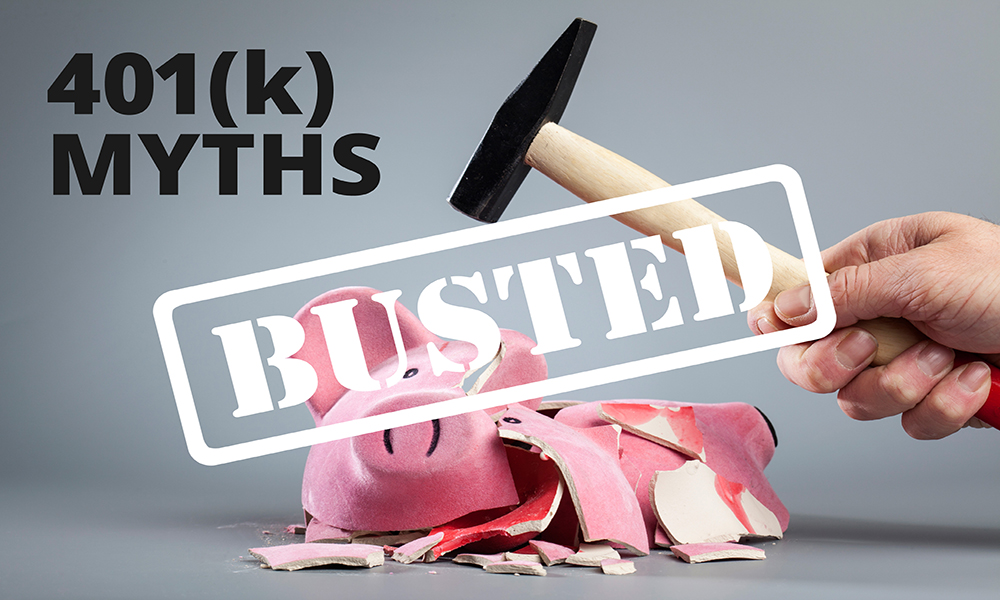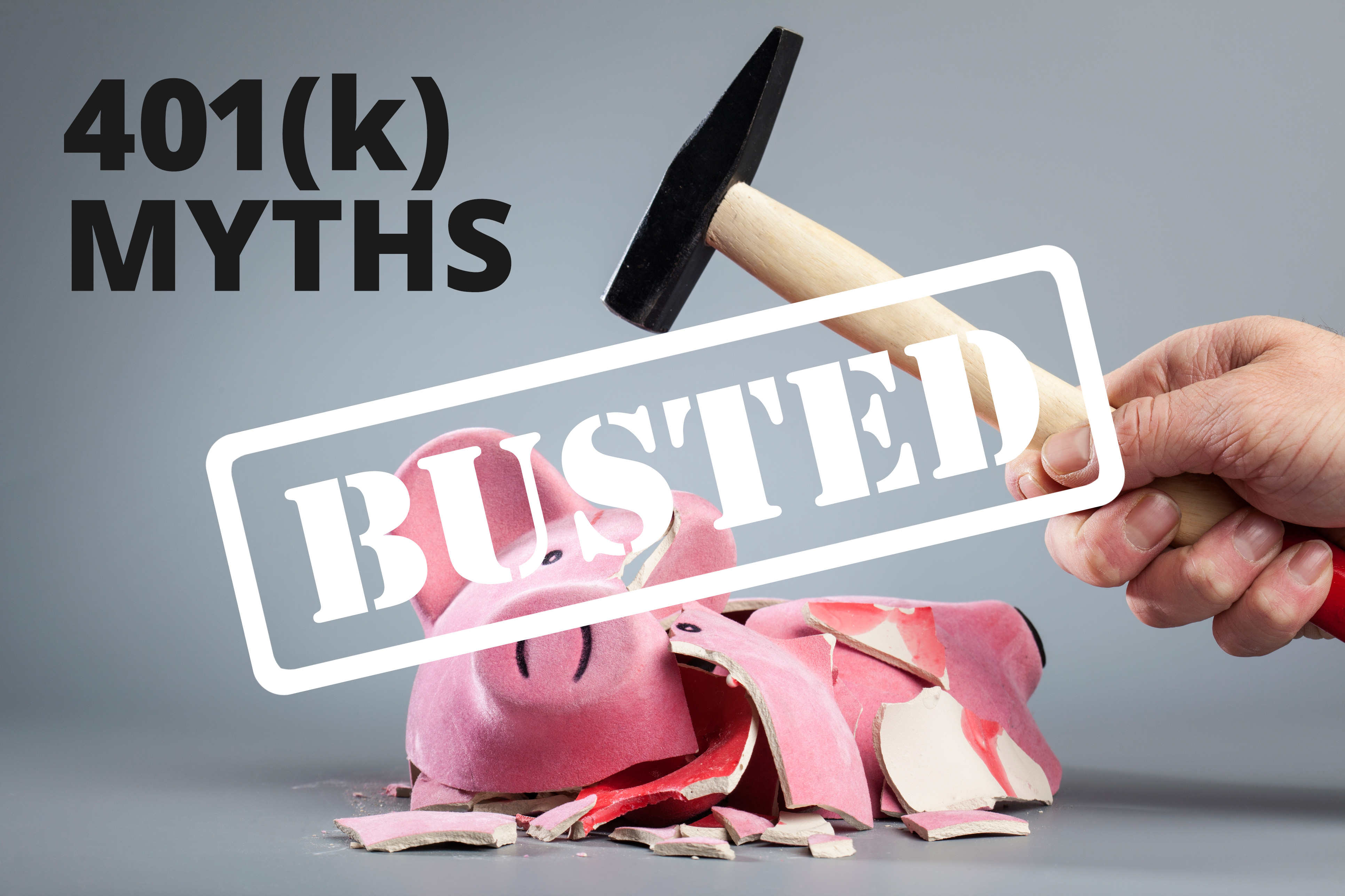The Payroll Blog
News, tips, and advice for small business owners
- Home
- Resources
- Payroll Blog
- 401(k) Small Business Myths
401(k) Small Business Myths: Part I
Even if you have recognized the need for a retirement plan for your small business, you may not have taken the step to set up a plan and enroll employees because of preconceived notions about how much a company plan will cost, how long it will take to set up, or the responsibility you as a small business owner will have for plan performance.

We rounded up some of the most common small business 401(k) myths and recently sat down with David Bass, a Sure401(k) specialist with over 20 years of small business retirement planning experience, to understand the facts.
Read on to learn more, and be sure to sign up for our free webinar, Maximize Your Retirement and Tax Savings in 2018.
401(k) Small Business Myths: Part II will be up later this week, be sure to check back on Thursday for more.
Myth 1: 401(k) plans are only for big companies.
David Bass: "Today's employment environment is highly competitive—and that level of competition doesn't start and end with big organizations. Small businesses need every competitive edge available to them to compete for quality employees. It's not like small businesses don't need or deserve quality employees as much as a large company. One step toward leveling the hiring playing field is offering a competitive benefits package.
"Over the last 18 years or so, we've seen an evolution in the retirement market when it comes to small businesses really being able to offer effective and competitive plans to employees. A number of regulations enacted around 401(k) plans have made the market small business friendly. For example, while some larger companies might have additional testing requirements built into their plans that increase the cost and management burden, many plans designed specifically for small businesses eliminate that level of requirement."
Bottom line: The retirement plan market is large and varied—meaning there is no such thing as a 'one-size-fits-all' retirement plan. It's critical that you consider plans designed specifically for small businesses, which offer targeted benefits and remove some of the big business requirements.
Myth 2: 401(k) plans are too expensive for small businesses.
DB: "The trend in 401(k) plans over roughly the last seven years has actually been a steady decline of overall expense. This shift stemmed from legislation around fee disclosure designed to provide more transparency for plan sponsors to see what they were being charged; as a result of fee disclosures, the retirement market has moved in a more competitive direction. All of this means a net reduction in fees for plan sponsors, which in turn means more affordable retirement planning options for employee.
"Additionally, most business owners look at the typical costs of a plan without realizing the potential tax benefits available. For small businesses in particular, there is a fantastic tax credit for eligible owners that can significantly offset the cost of setting up and administering the plan."
Bottom line: Plans designed for small businesses can cost as little as $87.50/month to manage...making them as affordable as your cell phone bill. Additionally, small business owners starting a 401(k) for the first time can qualify for a $500 tax credit for each of the first three years of the plan.
Myth 3: 401(k) plans take a lot of time to manage or are too complicated for small business.
DB: "This is a big misconception. Certainly in a small business environment there generally isn't the luxury of extra people and/or resources for additional administrative functions. One key to driving a successful retirement program, and to select a plan that will do so accurately, is having relevant employee census data. This is often where a small business owner might feel like they don't have the time or resources to collect the information needed to set up and administer the correct plan.
"What many small business owners fail to consider is how to piggy-back off of processes and systems already in place to effectively set up and run a retirement plan. For example, if you already use a payroll service, that service is already in the unique position of capturing employee data and changes as they happen in real time. It can be time and cost effective to bundle a retirement plan with your payroll to leverage that data and service to provide 401(k) administrative support, without taking the time to outsource and onboard a new or additional vendor."
Bottom line: While there's no getting around that setting up a 401(k) plan is a commitment in the form of time and resources, there are many cost-effective options to reduce that administrative burden by bundling your retirement plan management with other back-office services like payroll processing.
Myth 4: Employees don't care about retirement planning.
DB: "This is a pretty baffling myth, given that 75% of employees rank retirement plans as 'extremely' or 'very' 'important' when it comes to employer-provided benefits. I think the misconception might come from a breakdown in education when evaluating and rolling out retirement plans in a small business. It's critical that you have the right educational materials to drive interest and get people planning, and ultimately enrolled in your company's plan. Some of the more effective educational materials include things like retirement calculators, guides on how to allocate investments, interactive web tools and portals that give employees access to information and their portfolio.
"When you do offer the option of a retirement plan and really educate your employees on WHY they should save for retirement, the participation rates are really favorable. What you do not want to do is position it as 'so we are going to start taking more money from your paycheck'. You should always come from a place of asking employees if they'd like to save for retirement and what their retirement goals look like."
Bottom line: Employees DO care about retirement plans—in fact, employer-offered retirement plans rank 2nd only to healthcare when it comes to employer-offered benefits. Offering a competitive benefits package, including retirement planning, will allow you to compete for and retain quality talent, even in major markets.
These myths are just the tip of the iceberg when it comes to misconceptions surrounding retirement planning for small businesses. We'll explore four more common myths in Thursday's post, so be sure to check back.
Whether you're still on the fence about retirement planning for your small business, or you're ready to enroll but need more information, learn more by signing up to watch our free webinar, Maximize Your Retirement and Tax Savings in 2018.
Related Blog Posts
View Our Plans and Pricing
Small Business Is Our Business.
This website contains articles posted for informational and educational value. SurePayroll is not responsible for information contained within any of these materials. Any opinions expressed within materials are not necessarily the opinion of, or supported by, SurePayroll. The information in these materials should not be considered legal or accounting advice, and it should not substitute for legal, accounting, and other professional advice where the facts and circumstances warrant. If you require legal or accounting advice or need other professional assistance, you should always consult your licensed attorney, accountant or other tax professional to discuss your particular facts, circumstances and business needs.

